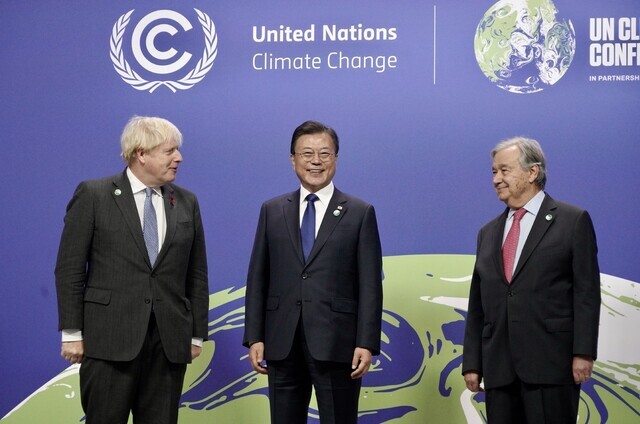hankyoreh
Links to other country sites 다른 나라 사이트 링크
Moon announces plan to cut carbon emissions more than 40% by 2030

South Korean President Moon Jae-in announced plans Monday for increasing South Korea’s Nationally Determined Contributions (NDCs) for 2030 to “achieve carbon neutrality by 2050” while “reducing emissions by 40% of 2018 levels.”
This marked the first time he has stated a concrete greenhouse gas reduction target for South Korea before the international community.
Moon’s remarks came during a keynote speech that day at a special summit during the 26th UN Climate Change Conference (COP26) in Glasgow.
“This summit is an important starting point toward limiting the rise in average global temperatures to 1.5 degrees of pre-industrial levels,” he said.
The South Korean government recently finalized a scenario for achieving carbon neutrality by 2050, with targets that include a full-scale halt of coal-fired power generation and the achievement of zero net greenhouse gas emissions domestically by that year. That led to an adjustment to the 2030 greenhouse gas reduction target, with the results announced by Moon during the world leaders’ summit.
“This is a bold target that represents an increase of roughly 14% from the NDCs submitted to the UN a year ago,” he said, adding that South Korea faces the “very challenging task of reducing [emissions] by 4% or more each year.”
The new target of reducing greenhouse gas emissions by 40% of their 2018 levels (727.6 million tons) by 2030 represents an increase of 13.7 percentage points from the 26.3% reduction target presented to the UN a year ago.
Moon further announced plans to take part in methane reduction efforts by joining the Global Methane Pledge, which the US, EU and UK are also participating in.
An Intergovernmental Panel on Climate Change report approved in August of this year cited methane as being responsible for around 30% of all global warming.
The Blue House said, “Our membership in the Global Methane Pledge will be an opportunity to play a leading role in the practical implementation of the Paris Agreement alongside the G7 countries.”
In a session on climate change and the environment during the G20 summit in Rome on Sunday, Moon announced plans to “keep pace with carbon neutrality by fully abolishing coal-fired electricity generation by 2050.”
He also said, “As the host nation for the World Forestry Congress in May 2022, [South Korea] welcomes the Leaders’ Declaration on Forests and Land Use that is to be adopted at COP26 and will cooperate proactively toward restoring forests in developing countries.”
In particular, he signaled his commitment to promoting sustainable development throughout the Korean Peninsula with support for forest recovery in North Korea.
Moon further proposed having regular Youth Climate Summit events to accompany the COP meetings.
“It is important for young people to participate in the international community’s discussions on climate change response, and for us to listen to what they have to say in order to reflect it in our climate policies and take action,” he said.
The event attended by Moon, which was the first special leaders’ summit in the six years since the UN Climate Change Conference held in Paris in 2015, has been referred to as the international community’s “last chance” to achieve the target of limiting the average rise in global temperatures to 1.5 degrees Celsius.
But the declaration that followed the earlier G20 summit in Rome referred only to “achieving global net-zero greenhouse gas emissions or carbon neutrality by or around mid-century,” while failing to nail down 2050 as a deadline for achieving carbon neutrality.
By Lee Wan, staff reporter
Please direct questions or comments to [english@hani.co.kr]

Editorial・opinion
![[Column] Park Geun-hye déjà vu in Yoon Suk-yeol [Column] Park Geun-hye déjà vu in Yoon Suk-yeol](https://flexible.img.hani.co.kr/flexible/normal/500/300/imgdb/original/2024/0424/651713945113788.jpg) [Column] Park Geun-hye déjà vu in Yoon Suk-yeol
[Column] Park Geun-hye déjà vu in Yoon Suk-yeol![[Editorial] New weight of N. Korea’s nuclear threats makes dialogue all the more urgent [Editorial] New weight of N. Korea’s nuclear threats makes dialogue all the more urgent](https://flexible.img.hani.co.kr/flexible/normal/500/300/imgdb/original/2024/0424/7317139454662664.jpg) [Editorial] New weight of N. Korea’s nuclear threats makes dialogue all the more urgent
[Editorial] New weight of N. Korea’s nuclear threats makes dialogue all the more urgent- [Guest essay] The real reason Korea’s new right wants to dub Rhee a founding father
- [Column] ‘Choson’: Is it time we start referring to N. Korea in its own terms?
- [Editorial] Japan’s rewriting of history with Korea has gone too far
- [Column] The president’s questionable capacity for dialogue
- [Column] Are chaebol firms just pizza pies for families to divvy up as they please?
- [Column] Has Korea, too, crossed the Rubicon on China?
- [Correspondent’s column] In Japan’s alliance with US, echoes of its past alliances with UK
- [Editorial] Does Yoon think the Korean public is wrong?
Most viewed articles
- 1[Column] Park Geun-hye déjà vu in Yoon Suk-yeol
- 2Thursday to mark start of resignations by senior doctors amid standoff with government
- 3N. Korean hackers breached 10 defense contractors in South for months, police say
- 4Kim Jong-un expressed ‘satisfaction’ with nuclear counterstrike drill directed at South
- 5[Editorial] New weight of N. Korea’s nuclear threats makes dialogue all the more urgent
- 6Will NewJeans end up collateral damage in internal feud at K-pop juggernaut Hybe?
- 7[Column] ‘Choson’: Is it time we start referring to N. Korea in its own terms?
- 8[Editorial] Japan’s rewriting of history with Korea has gone too far
- 9[Cine feature] A new shift in the Korean film investment and distribution market
- 10[Column] The president’s questionable capacity for dialogue